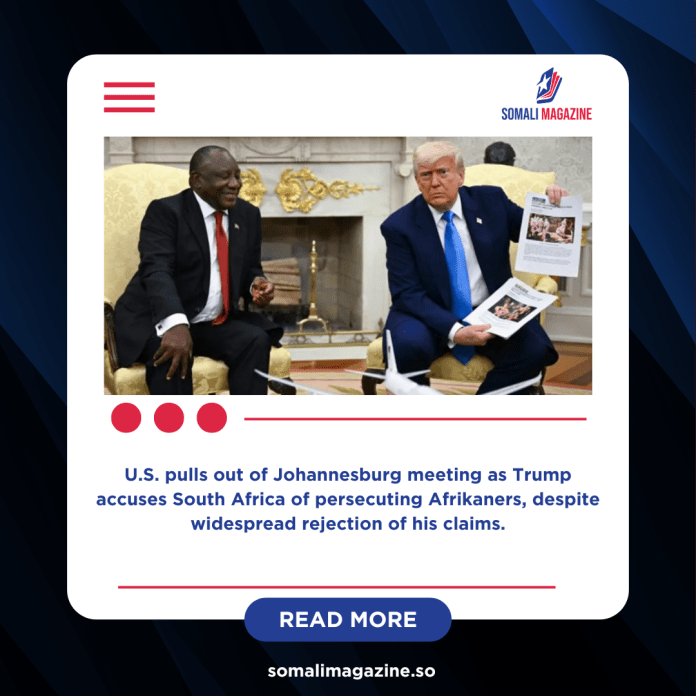Facebook Twitter (X) Instagram Somali Magazine - People's Magazine
President Donald Trump has announced that no U.S. officials will attend this year’s Group of 20 (G20) summit in South Africa, citing what he called the country’s mistreatment of white farmers. Writing on his Truth Social platform on Friday, Trump called it a “total disgrace” that the G20 meeting would be hosted in South Africa. He claimed that Afrikaners—descendants of Dutch, French, and German settlers—were being “killed and slaughtered,” and that their farms were being “illegally confiscated.” South African authorities have repeatedly dismissed these claims as false. Trump added that as long as these “human rights abuses” continued, no U.S. government official would attend the event, and he looked forward to hosting the 2026 G20 in Miami, Florida.
Trump had already said earlier in the week that he would skip the summit, which will be held in Johannesburg on November 22 and 23, and had urged that South Africa be expelled from the G20 altogether. U.S. Vice President JD Vance had been expected to represent Washington at the meeting, but sources confirmed to the Associated Press that he would no longer make the trip following Trump’s directive.
The dispute between the U.S. and South Africa began after President Cyril Ramaphosa introduced a new law in January aimed at addressing the country’s deep-rooted inequality in land ownership. More than 30 years after the end of apartheid, about three-quarters of privately owned land remains in the hands of the white minority. The new Expropriation Act allows the government to take land without compensation under certain circumstances—such as when land has been abandoned or is unused—to promote fair redistribution. Ramaphosa has emphasized that the policy does not amount to land confiscation but rather seeks to correct historical imbalances.
Trump, however, has sharply criticized the law, accusing South Africa of seizing property and discriminating against white citizens. “The United States won’t stand for it—we will act,” he declared earlier this year. In May, his administration granted asylum to 59 white South Africans under a resettlement program meant to provide refuge for those facing “racial discrimination.” That same month, Trump reportedly confronted Ramaphosa during a meeting at the White House, claiming that a “genocide” was taking place against white Afrikaner farmers. Ramaphosa rejected the accusation, pointing to three prominent white South Africans—golfers Ernie Els and Retief Goosen, and billionaire Johann Rupert—who were present at the meeting, saying, “If there was an Afrikaner farmer genocide, I can bet you, these three gentlemen would not be here.”
Experts have also dismissed Trump’s claims. South African historian Saul Dubow, a professor at the University of Cambridge, told Al Jazeera there was no evidence to support “Trump’s fantasy claims of white genocide.” He suggested that Trump’s anger may be linked to South Africa’s decision to bring a genocide case against Israel before the International Court of Justice over its actions in Gaza.
Despite widespread criticism, the Trump administration has continued to assert that white South Africans face persecution. In late October, the White House announced that most new refugees admitted to the U.S. would be white South Africans, while also cutting the total annual refugee cap to just 7,500. The statement said that the admissions “shall primarily be allocated among Afrikaners from South Africa” and other victims of discrimination around the world.
The move has deepened tensions between Washington and Pretoria, with South Africa accusing Trump of spreading misinformation and fueling racial division. The upcoming G20 summit, which brings together leaders of the world’s largest economies, was expected to be a chance to strengthen international cooperation—but the U.S. boycott has cast a shadow over the event, highlighting a growing diplomatic rift.

